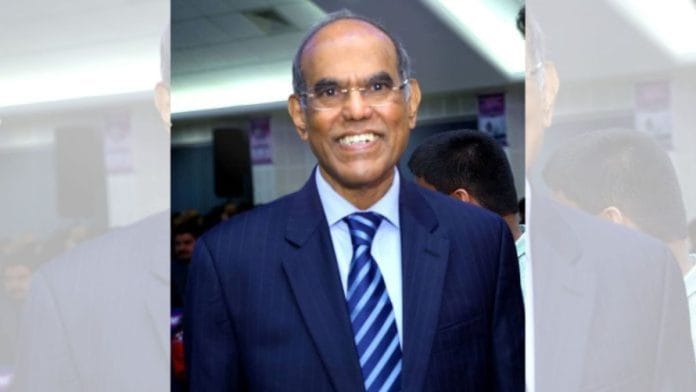New Delhi: The Reserve Bank of India should have raised interest rates “faster and steeper” during the “high and stubborn” inflation years of 2010 to 2012, according to former RBI governor D. Subbarao, who was in charge of the central bank at the time.
The high inflation between 2010 and 2012 was one of the regrets that he would want to undo, Subbarao said in an interview with ThePrint. The first regret, he said, was during his time as a collector in Andhra Pradesh. But the two others had to do with his time at the RBI.
“The second disappointment is the high and stubborn inflation between 2010 and 2012 during my tenure,” he said. “I realised that I should have raised interest rates faster and steeper than I had actually done.”
“We were acting in real time within the universe of knowledge available to us which was telling us that the growth was actually slow,” he added. “It was only with the benefit of hindsight that we learned that growth was actually faster than we knew in real time.”
Retail inflation in the 2010 to 2012 period averaged a scorching 10 percent. Over the course of 2010 and till October 2011, the RBI raised interest rates 13 times, from 4.75 percent to 8.5 percent. In 2012, it reduced rates somewhat to 8 percent.
Subbarao, who served as Governor for five years from September 2008 to September 2013, was discussing the lowest points and regrets of his career after the release of his memoir, ‘Just a Mercenary?: Notes from My Life and Career’.
The first regret he mentioned had to do with his time as collector in the Khammam district of Andhra Pradesh in 1974.
He said the tribals there were indebted while many of them were bonded labour, adding that many had lost their lands and money and they were living at subsistence levels.
“So I had dived headlong into implementing protective legislation which remained neglected before for a number of reasons and that project aborted within 9 months and I was transferred away.”
He said that he did not consult or inform his team while making the decisions without doing sufficient homework. “In the process my concern is whether in order to win the battle, I lost the war,” he said.
The third regret he spoke about was again about his role in the RBI, where he said he should have focused more on communication than he did, including communication with the public, the markets, and all other stakeholders.
Suggesting central banks on what they should do today, he said that communication has become another policy tool for central banks, and therefore they need to understand that it’s their responsibility to guide the markets, but in a measured way.
“Today, everything that the central bank says, even their lip movement, if they twitch their eyes, all that is seen as a market cue,” he said.
(Edited by Tikli Basu)
Also read: Election has come at a time just as private sector was about to step up investment







Voters should be reminded about double digit inflation during UPA regime. Reckless socialism masterminded by the crooks of national advisory council was one the reasons for overheating of the economy. Members of the NAC should be named and shamed and handed over to Taliban.